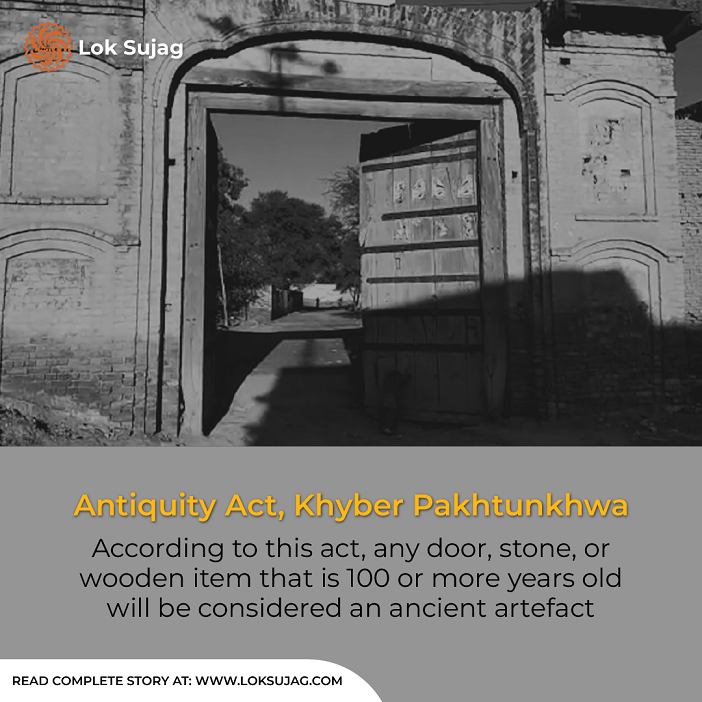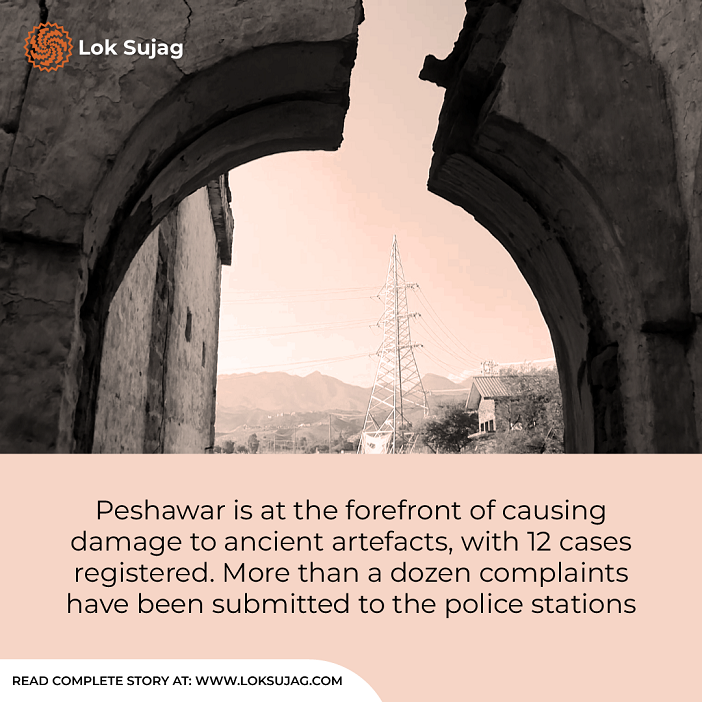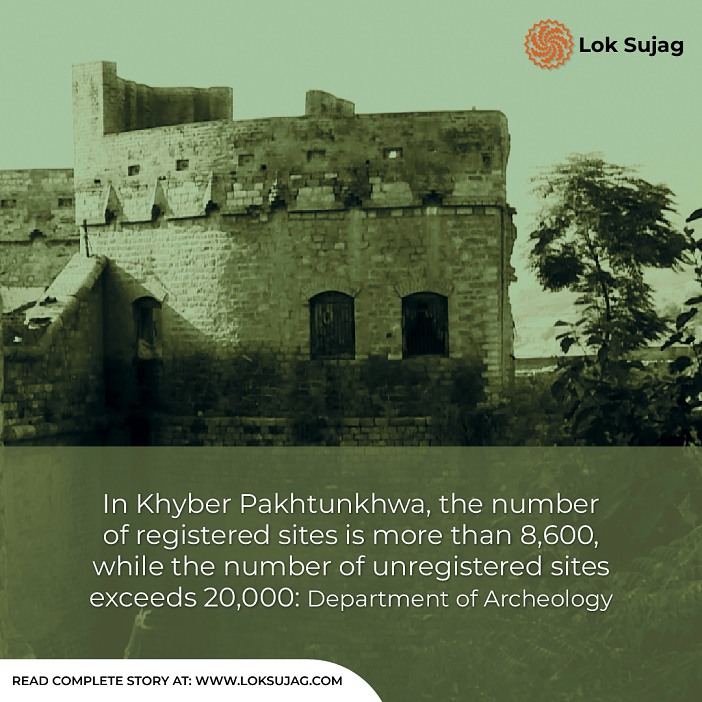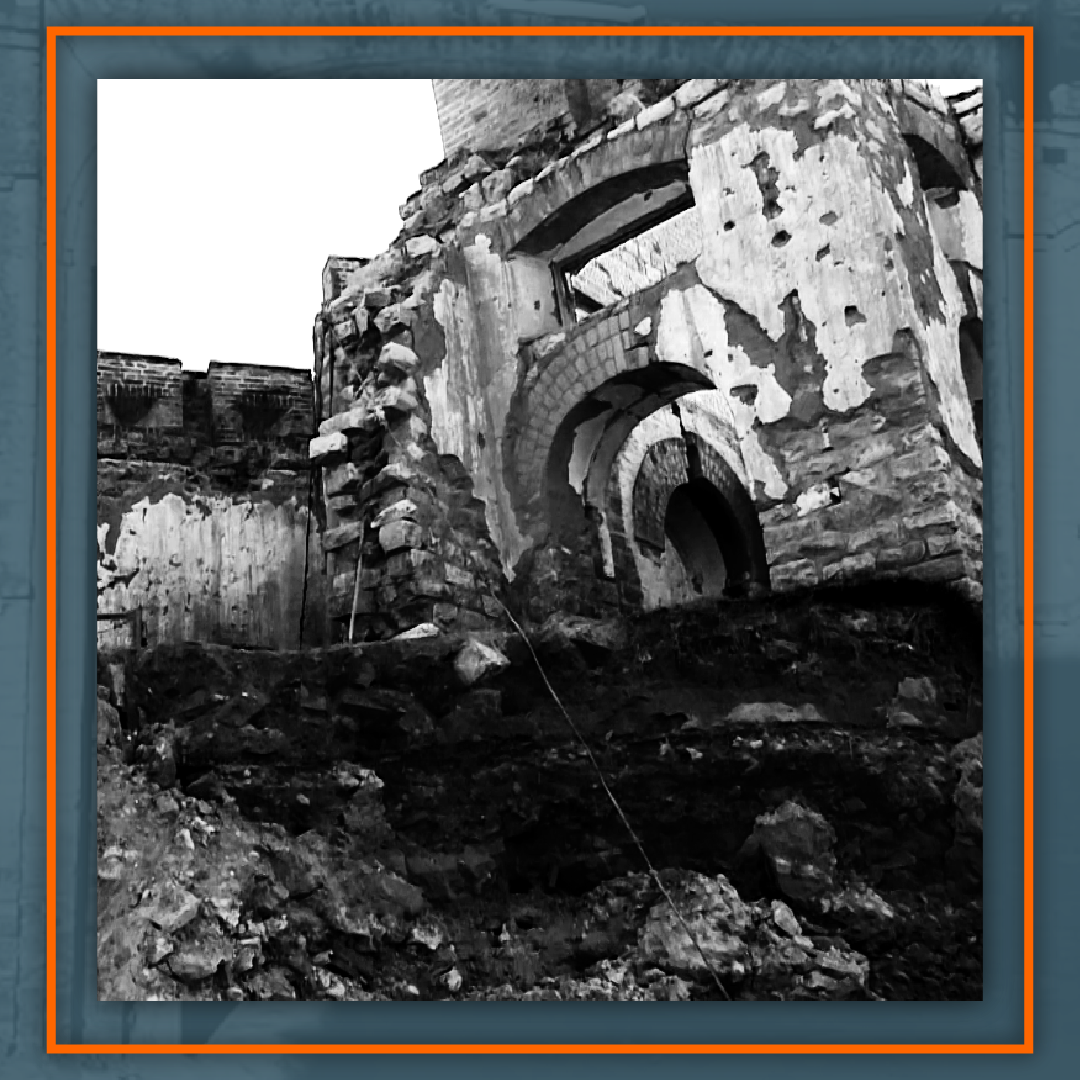In several districts of Khyber Pakhtunkhwa, including Peshawar, historical sites are under threat due to the lack of implementation of laws for preserving historical heritage and the absence of staff in the Department of Archaeology in all 22 districts of the province. As a result, incidents such as the demolition of historical sites, illegal smuggling of artefacts, and other violations are becoming increasingly common.
According to documents obtained from the Department of Archaeology, during the past five years – from 2019 to 2023 – a total of 113 historical buildings, stupas, artefacts, ancient structures, bridges, cemeteries, shrines and other cultural heritage sites have been damaged in Khyber Pakhtunkhwa. This damage has been reported in various districts, including Peshawar, Khyber District, Dera Ismail Khan, Swat, Nowshera, Charsadda, Mardan, and others where historical sites are present.
In response to these allegations, complaints were filed against more than 100 suspects in various police stations. The Department of Archaeology has registered FIRs against 38 of these suspects under the Antiquities Act. However, no charges have been formally filed against anyone, and no one has been sent to jail.
Peshawar is at the forefront of converting historical buildings into commercial plazas and residential structures, causing damage to bridges, historical sites, and ancient artefacts. So far, 12 cases have been registered here, and more than a dozen requests related to these incidents have been submitted to various police stations.

Most of these cases have been filed against the demolition of historical buildings. Mardan and Swabi are particularly notable, with cases registered against six individuals.
Only three individuals have faced legal action in the famous district of Swat, known for its Buddhist heritage. Manshera, Charsadda and Haripur have two FIRs registered each, while Abbottabad and Khyber have one FIR each. However, no one has been convicted or penalised in these cases.
What is Antiquity Act?
The Khyber Pakhtunkhwa government passed the Antiquity Act in 2016 to protect historical buildings and artefacts. According to the law, any site or object of historical or cultural significance 100 or more years old is designated as a national heritage, and legal action can be taken against those causing harm to such heritage.
According to this Act, any door, stone, piece of wood, or any other item that is 100 years old will be considered a part of ancient artefacts.
A five-member advisory committee was supposed to be formed to enforce this Act, but it has not been established yet. According to the law, a Heritage Board, headed by the Director of the Department of Archaeology, was also intended to be set. The purpose of this board was to ensure the preservation of historic buildings, artefacts, and other objects. The board was supposed to include experts in archaeology, engineers, historians, artists, and other relevant individuals. However, the board has not been formed as of now.

According to Section 18 of Chapter 3 of the Antiquity Act, causing harm to any historical site, including alteration or demolition, is considered a criminal offence. If proven guilty, the punishment is imprisonment for up to five years and a fine of two lakh rupees. Alternatively, one of these penalties may be imposed.
According to the curator of Swat Museum, Nawazuddin, whenever someone excavates historical heritage, causes damage to antiquities or is caught smuggling artefacts, action is taken under the Antiquities Act. However, this action is mainly in the name because no one has yet been fined or sent to jail for such offences.
"The department temporarily seals the site, and later, it is converted into plazas or other spaces."
He says, particularly in Peshawar, several incidents have occurred where historic buildings were demolished to construct commercial plazas. However, no practical action has yet been taken against those involved in these cases.
Bakht Muhammad, the Research Officer of the Department of Archaeology, says that the department takes action wherever there is a violation of the Antiquity Act.
According to Bakht Muhammad, 12 districts of Khyber Pakhtunkhwa have functioning offices, museums, and relevant institutions related to antiquities. Therefore, violations of the Antiquity Act are relatively low and no one can easily go against the Act in these areas.

"In 2022, further amendments to the Antiquity Act were made to tighten the noose around those involved in smuggling or causing damage to historical artefacts. However, there are some districts where department offices are not present and officials are not appointed. Therefore, there are challenges in apprehending violators of the Antiquities Act in those areas."
According to Muhammad, the number of registered sites in Khyber Pakhtunkhwa is more than 8,600, while the number of unregistered sites exceeds 20,000. According to him, 86 sites have been designated as protected sites to ensure their safety.
Significance of Peshawar in eyes of experts
According to an expert of antiquities and historian Dr Abasyn Yusufzai, the significance of Peshawar lies in the construction of the 17th-century Bala Hisar Fort, the Mahabat Khan Mosque, the marvellously constructed Victorian-style Peshawar Museum, the residence of Bollywood actor Dilip Kumar (late Yusuf Khan), Raj Kapoor Haveli, and numerous other buildings, bridges, tombs, and mosques.
Every year, thousands of tourists turn their attention towards this place, capturing the memories of this historic city through the lens of their cameras.
According to Dr Zakirullah Jan, an expert in ancient artefacts and Professor of Archaeology at the University of Peshawar, if the historical buildings of Peshawar continue to be transformed into plazas in this manner, the city’s history will be erased.

According to him, in Peshawar, more than 20 buildings have been demolished and transformed into plazas, but the department does not have a record. Several historical buildings here are awaiting restoration, and there is a need to work on preserving them.
"The mausoleum of Shah Qutb-ud-Din, or Sheikh Dheri, the tomb and mosque of Imam-ud-Din, and the garden of Sayyid are in an extremely dilapidated condition due to the lack of funds and can be demolished at any time. No government has undertaken any work to restore these historic buildings."
Who is responsible for deteriorating condition of Masjid Mahabat Khan and Ghanta Ghar?
The restoration project of the historical Mahabat Khan Mosque from the Mughal era, which began in 2017, is going very slowly. Until now, encroachments around the mosque have been eliminated, but timely measures to complete the project have not been taken. As a result, the restoration project, originally expected to be completed in June 2024, will now be finished in 2026, experiencing an additional two-year delay.
Director of the Department of Archaeology, Abdul Samad, mentions that the Chief Secretary of Khyber Pakhtunkhwa, Commissioner Peshawar Division, DC Peshawar, and relevant authorities are overseeing the restoration of Mahabat Khan Mosque. Efforts are being made to address encroachments around the Mosque because it is impossible to complete this project until the encroachments are removed.
Also Read

'Life is suffering': The trials and tribulations of the few remaining Buddhists in Pakistan
Millions of rupees have been spent to restore the historic area of Gor Khatri in Peshawar to its original condition, but scattered heaps of garbage and dilapidated conditions are still prevalent in various places.
Department of Archaeology does not extend its reach to former tribal districts
It has been five years since the merger of tribal districts into Khyber Pakhtunkhwa took place, but offices of the Department of Archaeology have not been established here. Unlike other districts of the province, there have been no appointments of inspectors and other staff in these regions.
Consequently, there is neither any mechanism to prevent violations of the Antiquity Act nor any awareness of the smuggling of artefacts or potential damage to historical sites in these areas.
18th Amendment and antiquities
According to Dr Zakirullah Jan, an expert in ancient artefacts and Professor of Archaeology at the University of Peshawar, the responsibility for preserving and caring for historical sites lies with the provincial government after the 18th amendment.
Bakht Muhammad says there are around 6,000 ancient archaeological sites in Khyber Pakhtunkhwa. With the assistance of experienced teams, identification and recording have been initiated for three thousand sites, and efforts have begun to preserve them. Survey activities for the remaining sites are also underway.
For preservation of archaeological sites, everyone has equal responsibility
Nawaz-ud-Din has been working as incharge at the Swat Archaeological Museum for the past several years, with expertise in ancient heritage matters. When asked about incidents causing damage to historical sites and the functioning of the department, he explains that in 2016, Khyber Pakhtunkhwa enacted a law, and practical work began on it. However, he says that the responsibility for preserving ancient artefacts lies not only with them but with everyone collectively.
"This is our shared heritage and history, so everyone should play their role to ensure its preservation. Educational institutions should emphasise this point because responsible nations preserve their history."
Published on 9 Jan 2024



















